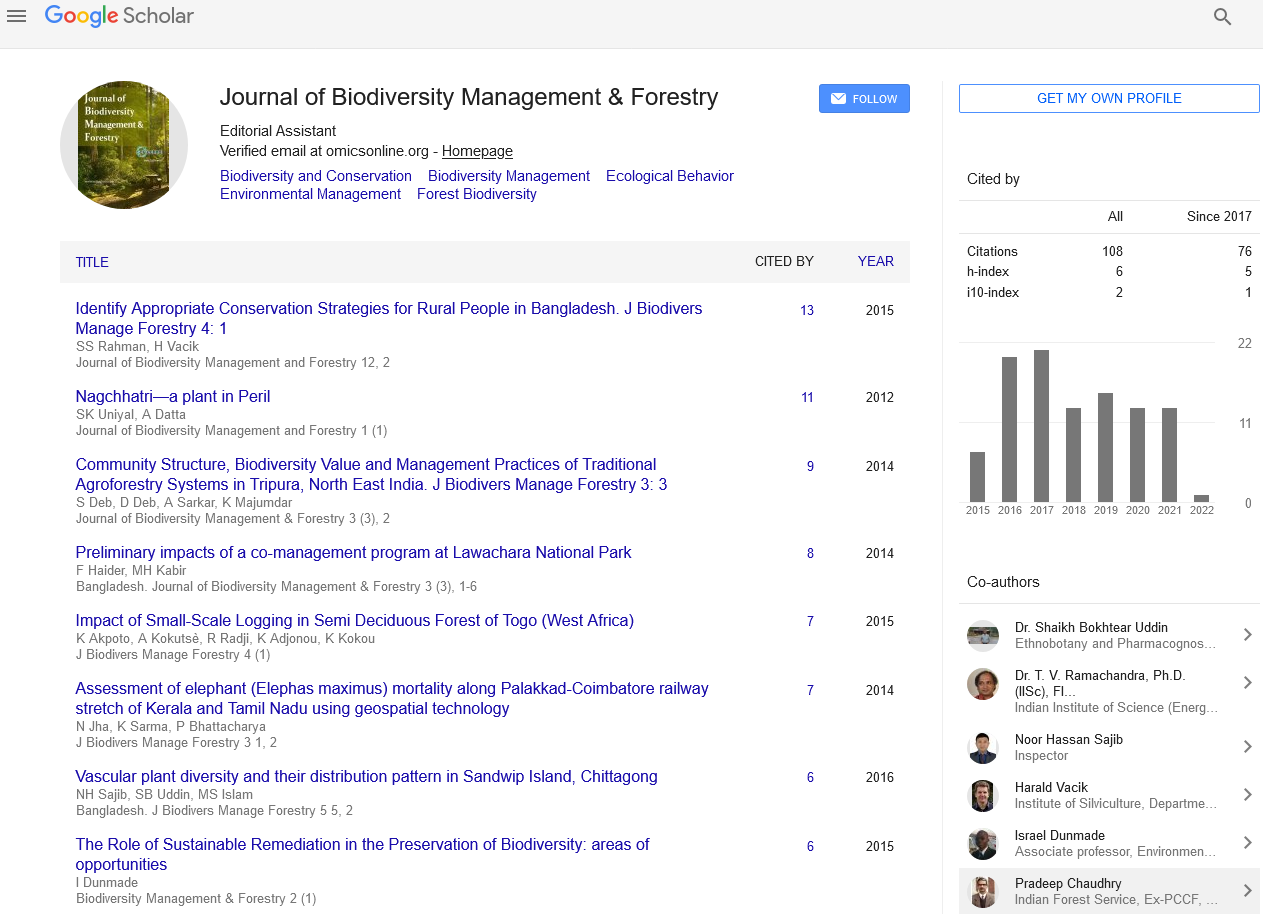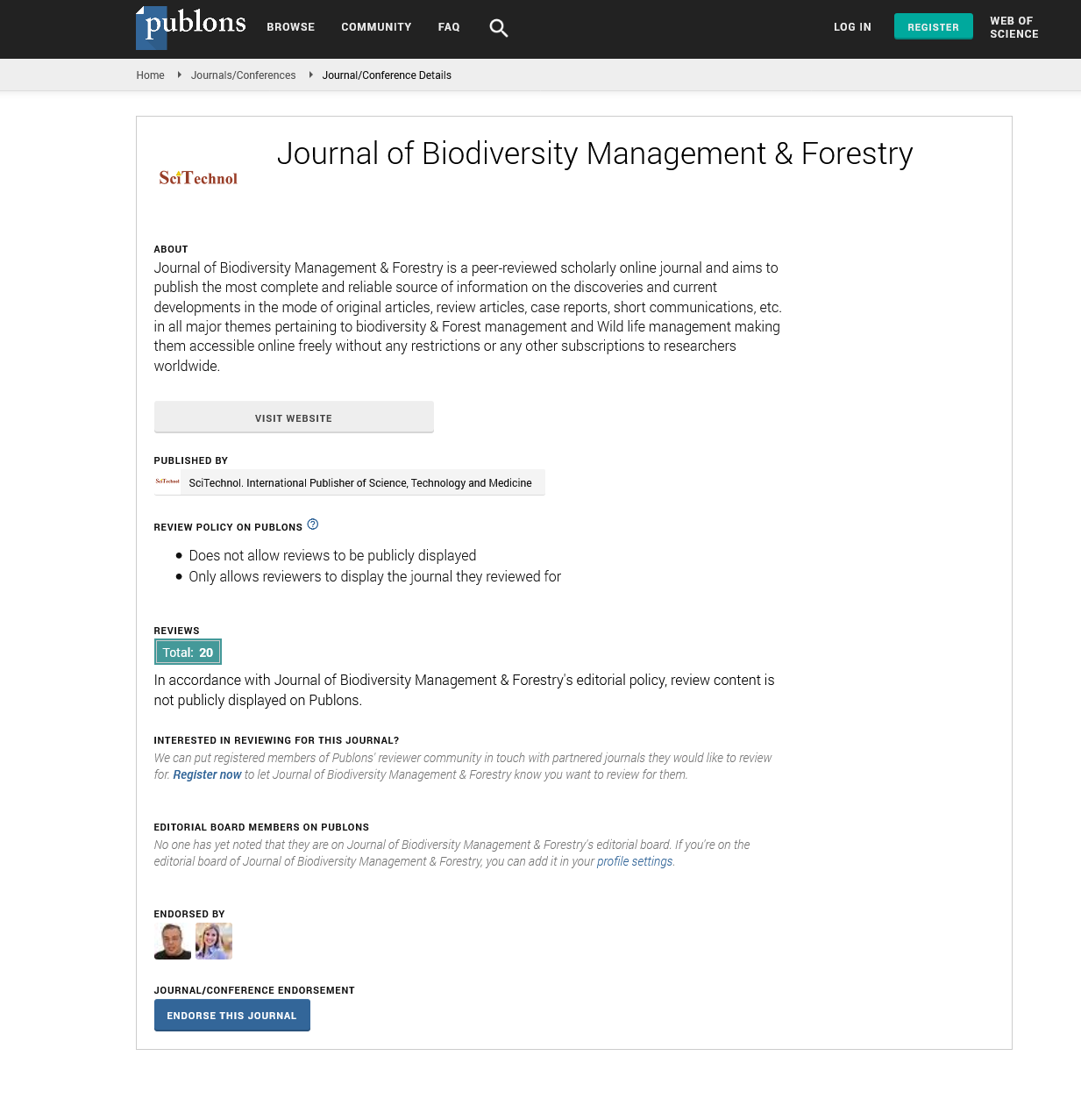Opinion Article, J Biodivers Manage Forestry Vol: 12 Issue: 2
Ecotourism and its Impact on Biodiversity Management
Frida Hancer*
1Department of Energy and Process Engineering, Norwegian University of Science and Technology, Trondheim, Norway
*Corresponding Author: Frida Hancer
Department of Energy and Process
Engineering, Norwegian University of Science and Technology, Trondheim, Norway
E-mail: frida.kni@hancer.edu
Received date: 27 March, 2023, Manuscript No. JBMF-23-98645;
Editor assigned date: 30 March, 2023, Pre QC No. JBMF-23-98645(PQ);
Reviewed date: 14 April, 2023, QC No. JBMF-23-98645;
Revised date: 22 April, 2023, Manuscript No. JBMF-23-98645 (R);
Published date: 29 April, 2023, DOI: 10.4172/jbmf 2327-4417.10039
Citation: Hancer F (2023) Ecotourism and its Impact on Biodiversity Management. J Biodivers Manage Forestry 12:2.
Description
Ecotourism is a form of tourism that focuses on visiting natural areas while minimizing negative environmental impacts and supporting the conservation of biodiversity. It is an alternative approach to traditional mass tourism, aiming to promote sustainable practices, local community involvement, and biodiversity conservation. This will discuss the concept of ecotourism and its impact on biodiversity management, highlighting its potential benefits and challenges.
Ecotourism is guided by several key principles that distinguish it from conventional tourism. Ecotourism aims to contribute to the conservation and protection of biodiversity and natural ecosystems. It promotes sustainable use of natural resources, minimizes negative environmental impacts, and supports the preservation of local cultures and traditions. Ecotourism emphasizes environmental education and interpretation. It seeks to raise awareness among tourists about the importance of biodiversity, ecological processes, and conservation issues. Interpretive activities and guided tours provide opportunities for visitors to learn about the local environment and the challenges it faces. Ecotourism emphasizes the involvement and empowerment of local communities. It seeks to provide economic benefits and improve livelihoods for local people by promoting their participation in tourism activities and offering opportunities for community-based enterprises.
Ecotourism strives to minimize negative environmental impacts. It encourages responsible behavior, such as reducing waste, conserving water and energy, respecting wildlife and natural habitats, and supporting local conservation initiatives. Ecotourism can have several positive impacts on biodiversity management and conservation. Ecotourism generates economic benefits for local communities and stakeholders, providing them with incentives to conserve natural resources and protect biodiversity. By providing sustainable livelihoods tied to the conservation of natural areas, ecotourism can help to reduce pressures on ecosystems from other economic activities, such as deforestation or overexploitation of resources.
The revenue generated from ecotourism can be directed towards supporting conservation initiatives, such as habitat restoration, antipoaching efforts, and scientific research. These financial resources can contribute to the effective management and protection of biodiversityrich areas. Ecotourism provides opportunities for tourists to learn about the importance of biodiversity and conservation. Through guided tours, interpretive activities, and engagement with local communities, visitors gain a deeper understanding of the ecological significance of the area they are visiting. This raised awareness can lead to greater support for conservation efforts and behavioral changes that promote sustainability. Ecotourism often requires the preservation and restoration of natural habitats to maintain their attractiveness and biodiversity value. Protected areas, national parks, and nature reserves established for ecotourism purposes serve as important sanctuaries for wildlife and ecosystems. Additionally, ecotourism can contribute to habitat restoration efforts, such as reforestation projects or the removal of invasive species, enhancing the quality and resilience of ecosystems. While ecotourism holds great potential for biodiversity management, several challenges need to be addressed to ensure its effectiveness. Careful planning and management are required to prevent excessive tourism pressure on fragile ecosystems. Effective carrying capacity assessments and visitor management strategies can help minimize negative impacts and maintain the integrity of natural habitats. To be truly sustainable, ecotourism operations must adhere to strict environmental guidelines and standards. It is essential to monitor and regulate tourist activities, promote responsible behavior, and ensure compliance with sustainable practices, such as waste management, energy efficiency, and protection of wildlife.
 Spanish
Spanish  Chinese
Chinese  Russian
Russian  German
German  French
French  Japanese
Japanese  Portuguese
Portuguese  Hindi
Hindi 
